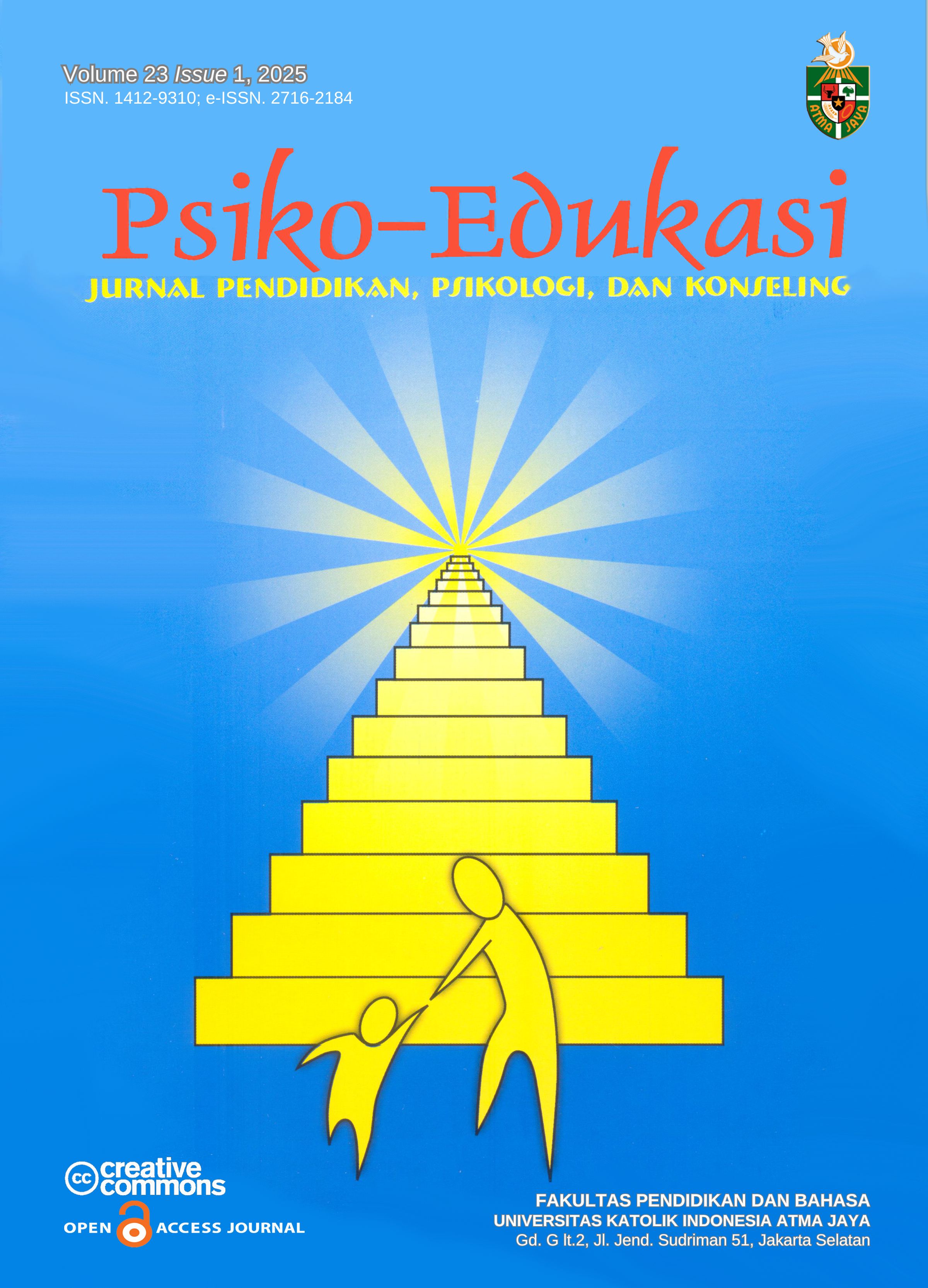ANALYSIS OF STUDENT PROBLEMS IN GRADE X USING THE EMPHATIZING METHOD AT STATE SENIOR HIGH SCHOOL 78 JAKARTA
DOI:
https://doi.org/10.25170/psikoedukasi.v23i1.6721Keywords:
problem analysis, empathize method, user extreme technique, design thinkingAbstract
Problem analysis is one of the important stages in implementing guidance and counseling services in schools. One method that can be used to conduct problem analysis is the empathizing method in Design Thinking. Design Thinking (DT) is one of the methods widely used to solve problems creatively with a focus on understanding user needs. This study aims to explore the problems faced by class X students at SMA Negeri 78 Jakarta. These problems are explored based on four aspects of guidance and counseling: personal, social, academic, and career aspects. Data collection was carried out through in-depth interviews, the results of which were analyzed with extreme users. Extreme users is a technique to build empathy and truly understand the problems faced by extreme users, which aims to help reframe problems and uncover new insights. The results of the study show several problems in the four aspects of BK services faced by class X students of SMAN 78 Jakarta. These problems include not having good self-control, especially in time management, not being able to determine priorities, not having emotional maturity, lacking self-confidence, being closed off from their social environment, liking to procrastinate on assignments, lack of motivation to study, and lack of knowledge about the world of college, including majors, entry routes and the variety of universities that are most likely to be of interest.
References
Astuti, J. P., Mayangsari, M. D., Zwagery, R. V. (2019). Hubungan Kesadaran Diri dengan Flow Akademik pada Siswa di Daerah Lahan Gambut. Jurnal Kognisia, 2(2), 68-74.
Baumeister, R. F., Vohs, K. D., & Tice, D. M. (2013). Self-control, ego depletion, and energy. In R. F. Baumeister & K. D. Vohs (Eds.), Handbook of Self-Regulation: Research, Theory, and Applications (2nd ed.). New York: Guilford Press.
Brown. (2009). Change by Design: How Design Thinking Transforms Organizations and Inspires Innovation. New York: Harper Business.
Chao, R. K., & Tseng, V. (2015). The Role of Parental Involvement and Expectations in Academic Achievement: A Review of the Literature. Journal of Adolescence, 38(4), 27-39.
Chirkov, V., Ryan, R. M., Kim, Y., & Kaplan, U. (2015). Differentiating Autonomy from Individualism and Independence. Journal of Personality and Social Psychology, 108(6), 987-1003.
Dyanasta, R. (2015). Keefektifan Klarifikasi Nilai untuk Meningkatkan Kesadaran Nilai Tanggungjawab Akademik pada Siswa. PSIKOPEDAGOGIA, 4(2), 136-142
Eisenberger, R., Karahanna, E., & Meyer, J. (2016). Social Support and Motivation in the Workplace: A Review and Theoretical Framework. Journal of Applied Psychology, 101(7), 1204-1218.
Furman, W., & Buhrmester, D. (2013). "The Development of Companionship and Intimacy." Child Development, 66(3), 591-607.
Gresham, F. M., & Elliott, S. N. (2017). Social Skills Improvement System: Rating Scales Manual. Pearson.
Grusec, J. E., & Davidov, M. (2010). "Socialization and Development." Handbook of Socialization: Theory and Research, 1-24.
Hawkley, L. C., & Cacioppo, J. T. (2015). Loneliness and Social Isolation. Current Directions in Psychological Science, 14(2), 58-63.
Lerner, R. M., & Miller, M. J. (2012). "Social Responsibility and the Development of Character." Journal of Applied Developmental Psychology, 33(3), 172-181.
Liedtka, J. (2015). Perspective: Linking Design Thinking with Innovation Outcomes through Cognitive Bias Reduction. Journal of Product Innovation Management, 32, 925-938.
Oktavia, A. N., & Dwijayanti, R. (2024). Persepsi Kesiapan Memasuki Dunia Kerja Siswa di SMKN 4 Surabaya. Jurnal Pendidikan Tata Niaga (JPTN), 12(1), 35-46
Olmstead, S. B., et al. (2016). The Impact of Social Media on Adolescent Mental Health: A Systematic Review. Journal of Adolescence, 53, 98-111.
Pargament, K. I. (2018). The Psychology of Religion and Coping: Theory, Research, Practice. Guilford Press.
Puspitawati, D., & Kurniawan, S. (2020). Studi Kesehatan Mental Remaja di Sekolah Menengah Atas: Sebuah Tinjauan. Jurnal Psikologi, 16(2), 120-135.
Putri, N. D. A., Nugroho, A. A., Satwika, P. A. (2022). Pandangan akan Masa Depan dan Kematangan Karier Siswa SMK A View of the Future and Career Maturity of Vocational Student. Jurnal Ilmiah Psikologi Candrajiwa, 7(1), 60-67
Rothstein-Fisch, C., & Trumbull, E. (2011). Managing Diverse Classrooms: How to Build on Students' Cultural Strengths. Pearson.
Ryan, A. M., & Deci, E. L. (2000). Self-determination theory and the facilitation of intrinsic motivation, social development, and well-being. In R. M. Ryan & E. L. Deci (Eds.), Handbook of Self-Determination Research. Rochester, NY: University of Rochester Press.
Schmeichel, B. J., et al. (2010). Self-control and ego depletion: The resources model of self-regulation. In R. Baumeister & K. Vohs (Eds.), Handbook of Self-Regulation (2nd ed.). New York: Guilford Press.
Smetana, J. G., et al. (2014). Parent-Adolescent Conflict and the Role of the Parent-Child Relationship in Adolescent Development. Child Development, 85(5), 1714-1728.
Steinberg, L. (2017). Adolescence. McGraw-Hill Education.
Sugiyono. (2012). Metode Penelitian Pendidikan: Pendekatan Kuantitatif, Kualitatif, dan R&D. Bandung: Alfabeta.
Trower, P., et al. (2016). The Impact of Social Withdrawal and Avoidance on Mental Health. Journal of Social and Clinical Psychology, 35(5), 417-430.
Vroom, V. H. (2016). Work and Motivation. Wiley.
Wentzel, K. R. (2016). Motivation and Achievement in Educational Contexts. In Handbook of Educational Psychology (pp. 203-217). Routledge.
Zimmerman, B. J. (2016). Motivational Influences on Academic Performance. Educational Psychologist, 51(1), 1-23.


















